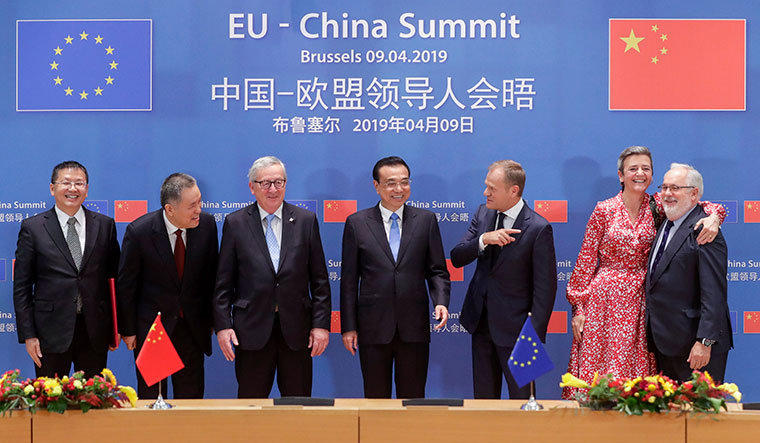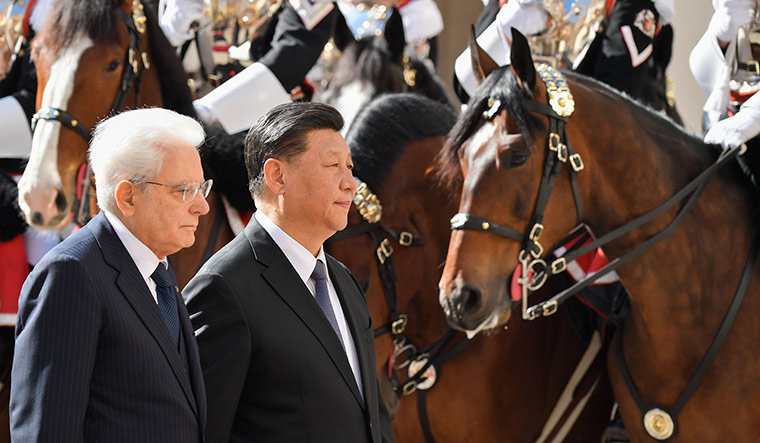The European Union seems to be toughening its stance against China, after cuddling the ‘Giant Panda’ for decades. In a strategic shift, an “assertive” EU has alleged that China disregards international rules, discriminates against foreign firms and dodges a level-playing field. German Chancellor Angela Merkel said the most urgent problem for the EU with China was to ensure reciprocity regarding market access. Jean-Claude Juncker, the outspoken president of the European Commission, said, “Limits are set for us when we set no limits for Chinese investors. This can’t be.”
In a strategy paper published ahead of its summit with China on April 9, the EU called China a “competitor” and a “systemic rival”, which practised “alternative models of governance” in politics and in business. Said French President Emmanuel Macron, “Power cannot be without rivalry. We are not naïve.”
The EU has started to act tough, weaponising policy instruments to restrict Chinese acquisition of strategic assets, thwart forcible technology transfers and control cheap Chinese imports. The unusually strong stand by the EU forced China to agree not to make companies share intellectual property at the April summit. China also agreed to work towards opening up its economy for foreign investors. Jo Leinen, president of the European Parliament’s China delegation, said the EU was forced to wake up and protect itself because, in a few years, China had changed from a friendly partner into an unfriendly rival.
But to the EU’s dismay, a dozen European countries have rolled out the red carpet to the Chinese caravan of projects, money and deals comprising its Belt and Road Initiative (BRI), a 21st century Silk Road aiming to fulfil President Xi Jinping’s “China Dream” of restoring lost glory. China intends to emerge as the centre of the universe, not by firing intercontinental missiles, but by assembling an intercontinental economic programme through a web of roadways, railroads, pipelines and shipping routes crisscrossing three continents. As the Chinese military strategist Sun Tzu wrote 2,500 years ago in his treatise The Art of War, “The greatest victory is that which requires no battle.”
Forget battle, Italy, a key member of the EU, embraced BRI and welcomed Xi with imperial pageantry. There were grenadiers in tall bearskin hats and horsemen in shining armour and plumed helmets to receive Xi, the grandeur of the moment reminiscent of an era when all roads led to Rome. “Made in Italy” is now a jewel in the “Made in China” BRI crown. Bagging a G7 country and the tenth largest economy of the world is a coup, even though Italy is in recession, with high debt and crumbling infrastructure. The $2.8 billion deals are not dramatic, but their potential is. Bruno Maçães, Portuguese political scientist and author of Belt and Road: A Chinese World Order, said the economic map of Europe was ripe for a revolution.
With Chinese investment, Italy’s Trieste port can out-compete the north European trading ports of Rotterdam, Antwerp and Hamburg, the engines of Europe’s industrial progress since the 17th century. Trieste is closer to Munich, Europe’s industrial heartland. Michele Geraci, undersecretary of state at the Italian ministry of economic development, said, “Trieste can become China’s gateway to Europe.”
Together with Trieste, the ports of Piraeus in Greece, Sines in Portugal and Valencia in Spain can transform into pearls on China’s industrial chain, transporting goods between Shanghai and Europe in 33 days, 10 days faster than by the northern route. “It’s a win-win situation,” said Italian Deputy Prime Minister Luigi Di Maio.
Not everyone agrees. His rival and coalition partner, Deputy Prime Minister Matteo Salvini, abstained from the ceremonies. Branding foreign businesses as “colonisers”, he warned, “Before allowing someone to invest in the ports of Trieste or Genoa, I would think about it not once, but a hundred times”. Italian newspaper La Repubblica described Xi as the “Godfather of Rome”. From across the Atlantic, the US National Security Council spokesman Garrett Marquis tweeted, “Italy did not need to lend legitimacy to China’s vanity infrastructure project and its predatory approach to investment that will bring no benefits to the Italian people.”
“All warfare is based on deception,” wrote Sun Tzu. Western powers see China as a “stealth superpower”, deploying its gigantic geopolitical project as a Trojan Horse to encroach, extend and deepen its strategic influence in Europe, Asia and Africa. The BRI straddles the earth from Mongolia to Montenegro, encompassing 4.5 billion people representing one-third of the world’s wealth. NATO Secretary General Jens Stoltenberg declared, “China is not a military threat, but it has come nearer to us.” NATO is currently assessing the security implications of Chinese investments on Europe’s digital and physical infrastructure.
The furore over Huawei as a global Chinese spy tool rages, which Xi tried to play down. “We cannot let mutual suspicion get the better of us,” he said. But the EU is not about to let its guard down. And what China does openly is bad enough. The EU strategy paper acknowledged the BRI’s commercial potential, but also red-flagged the perils that needed tackling: plunging participating countries into debt, using unfair trade practices, providing state subsidy and cheap credit to Chinese companies, especially hi-tech firms, employing espionage, corrupting procurement practices, manipulating media, flouting environment and labour standards, legitimising opaque procedures and taking “decisions not based on science”. The EU counters with an alternate “sustainable” Europe-Asia connectivity programme. “For the first time, there is a common strategy,” said Macron.
China’s response has been glacial. Zhang Ming, China’s ambassador to the EU, said the concerns would be “gradually addressed” as China opened up its economy at a “reasonable pace”. The EU is also appalled by the “China-effect” on European values. “One (European) country is unable to condemn China’s human rights policy because Chinese investors are travelling in its port,” said Juncker. “Another country cannot support a decision of the Human Rights Commission because Chinese investors are travelling in its territory. It can’t work like this.”
It, however, works because of divisions within the EU. China and the EU are each other’s second largest trading partners, transacting goods worth €1 billion every day. But competing interests corrode unity. France and Germany see China as a growing economic and strategic threat. Sweden is ambivalent. Greece, Croatia, Romania, Poland and Hungary are all enthusiastic about cooperation. Europe’s pro-China lobby is significant. The southern, central and eastern countries in the EU and several west Balkan nations queuing up to join the EU are hungry for funds to improve their infrastructure. They are frustrated by the EU’s bureaucracy and irritated by German and French domination. Cuddling China and accessing quick, no-lectures and no-strings-attached money is tempting. Asked Peter Frankopan, Oxford University professor and author of The Silk Roads, “If investment does not come from China to build ports, refineries and railway lines, then where will it come from?” These European countries have formed the 16+1 bloc with China. Macron warned Xi, “Respect the unity of the European Union.”
But divide and rule is not a British patent. Warriors look for cracks in the enemy flank. Fortress Europe would be impossible for Xi to penetrate, but a divided, disgruntled and financially famished continent is a dream come true for China. If EU unity weakens, China can build strong bilateral economic relations with its members, gain access to markets, assets, resources and technology and steer an era where all roads lead to Beijing. Said German Foreign Minister Heiko Maas, “China is a challenge on almost every topic.”



